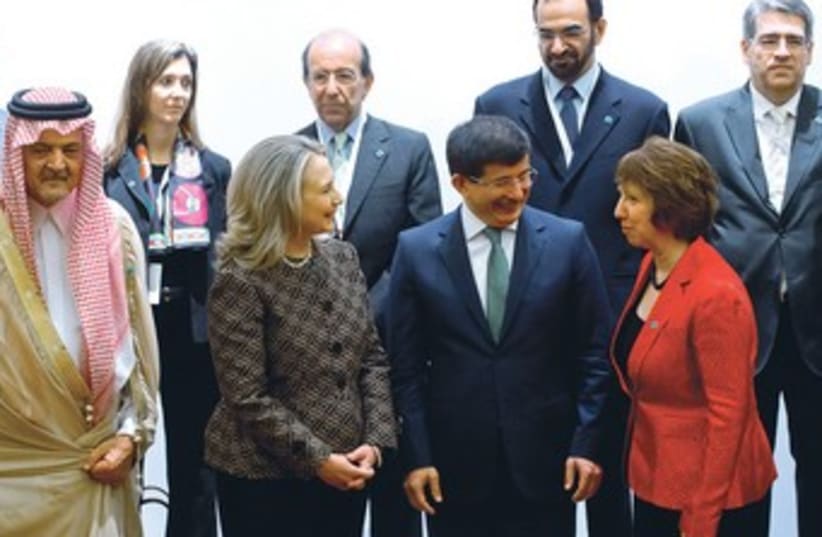Iran: Shi’ite defiance and revolutionary aggressionIran sets the most defiant pattern and represents the revolutionary Shi’ite school, which threatens the West, Turkey and Israel. After the demise of Saddam Hussein’s tyranny in Iraq, the Shi’ites have risen to power in this important country, where the holiest places of the Shi’ite sect are located.With the rise of the security elite, Pasdaran, under Iranian President Mahmoud Ahmedinejad and via the robust influence of the clergy in Qom, Tehran strives to consolidate the “Shi’ite crescent” in the region. Lebanese Hezbollah’s resistance against the IDF in 2006 gave hope to Iran, and showed that through irregular warfare, including terrorism and proxy wars, they can overcome superior adversaries.It is argued that Iran’s rogue nuclear program well exceeds the military strategic calculus. Indeed, it represents the very center of defiant symbolism against the West by challenging the Gulf States, which are crucial for the global energy flow, as well as Turkey and Israel, the two democracies of the Middle East.Essentially, many Westerners are ill-informed regarding the major sectarian split in Islam. Historically, the conflict of Sunni and Shi’ite denominations is not mainly about theology, but rather about politics.The essential schism was about who would rule the Ummah after the Prophet Mohammad passed away.Iran’s answer is to challenge the international system through its irregular warfare capacity, revisionist ideology, strict Imamate culture, and nuclear program.Turkey: Imperial assertions, secular character and soft powerApart from Albania, a former Ottoman territory, Turkey remains the only NATO member with Muslim majority population. Clearly, Ankara has stronger ties with the West than do Egypt and Iran. The harmony between Turkish Prime Minister Recep Erdogan and US President Barack Obama in particular upgraded Turkish-American relations to a promising level.Turkey sets the only secular, democratic example in the Islamic world, although after the Justice and Development Party (JDP) assumed power in 2002, the Turkish model now seems to be more of a combination of conservative Islamic values and secular democracy.Compared to its rivals, Ankara enjoys high international trade and finance performance and political stability. Moreover, in the Islamic world its military capacity can only be compared to that of nuclear Pakistan.The first years of the JDP were spent in the Turkish government’s power struggle against the military elite and the traditional ultra-secularist bureaucracy and high judiciary.After the JDP ensured its influence, the party’s foreign policy architect, Prof. Ahmet Davutoglu, assumed the foreign ministry post.Especially after this appointment, Ankara showed a greater emphasis on Ottomanist imperial identity, and started to bring its soft power assets into the foreground. On the other hand, Turkey’s modern face continued to play its charm offensive role in the Muslim street.Turkish soap operas, in which themes and scenes generally represent a secular and modern lifestyle, are getting more and more popular among Arab societies. Besides, Prime Minister Erdogan courageously advised Cairo to embrace a secular system in his interview with an Egyptian television in 2011.Thus, Turkey’s “offer to the Ummah” is integrating democracy and secularism with religious values, in harmony with the West, and of course under the imperial guidance of the Ottoman Empire’s successor.However, Ankara faces some challenges which might hinder its ambitions. First, Kurdish separatist terrorism remains its Achilles’ heel, as it offers proxy war options to any adversaries. As a matter of fact, on August 20, 2012, a terrorist explosion killed nine and wounded over 60, mostly civilians, in Turkey’s Syrian border city Gaziantep. After the attack, top figures of the JDP openly pointed out “the Syrian connection.”Second, Ankara should pursue a careful balance between conservatism and modernist secularism as this is vital for the country’s political stability, as well as its strategic communications and soft power capabilities.Finally, the Ottoman nostalgia does not appeal to Arab societies as it appeals to the national pride of the Turks. Thus, Turkey might face being perceived as a neo-colonial power because of its ambitions.
Egypt: The high hopes of the Muslim BrotherhoodDuring the protests in Cairo, the West wishfully expected the liberal, social activist youth of the Tahrir Square to lead the country in the post-Mubarak period. However, power vacuums are generally followed by the takeover of the most organized group; enter the Muslim Brotherhood (MB).Then, the majority of analysts expected Egyptian President Mohamed Mursi to embrace a gradually hardening approach, as transpired with the Turkish JDP. However, the power of the JDP relies on ballots, that of the MB on social momentum.Clearly, Prime Minister Erdogan was aware that through good governance and prosperity, increasing public support would give him the upper hand against the military elite, while Mursi knows the Egyptian military elite is waiting for the dust to settle before reclaiming its privileged position.The main advantage of the MB is its ideology, which can mobilize masses, and play “the democrat role” as required. It offers Muslim societies the chance to free themselves from their monarchs and dictators without embracing West’s cultural values.However, the MB has its own challenges to face, involving the international balance of power; clearly, it can’t go too far in threatening the very existence of Israel, encourage full-scale oppression against seculars, or exert full control over the media.The importance of SyriaSyria is likely to determine the possible trajectory of the contest.Turkey is trying to topple the Ba’athist dictatorship, while Iran diligently supports its ally and gate to Hezbollah. Furthermore, if Assad’s regime falls, the Syrian MB has a strong chance to assume power.In conclusion, three schools of thought are now competing to answer the oldest question of Islam: “Who will rule the Ummah?”The author, who served as a postdoctoral fellow for the Begin-Sadat Center for Strategic Studies, holds a PhD from the Turkish War College, and a master’s degree from the Turkish Military Academy.
